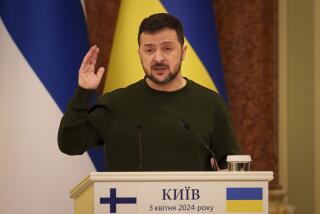Trial Gets Under Way for Ceausescu Security Police : Romania: ‘I didn’t want to shoot anyone,’ pleads a major convicted of attempted murder<i> .</i>
BUCHAREST, Romania — Captured members of dictator Nicolae Ceausescu’s feared security police went on trial before military courts Monday, charged with trying to crush the uprising that ended his 24-year reign last month.
The first such “terrorist”--as the new Romanian government calls them--to be convicted was found guilty of attempted murder and sentenced to nine years in prison, state radio reported.
The defendant, identified as police Maj. Ion Bundea, 49, was convicted of shooting a man when he opened fire on five army officers Dec. 22 in the city of Sibiu in southern Transylvania. Excerpts of his trial were shown on Romanian television.
The prosecution said Bundea was trying to shut down a military telephone switchboard to cut communications with other anti-Ceausescu army units when he encountered the army officers. He was subdued after shooting one.
Bundea, a stocky man with iron-gray hair and moustache, appeared close to tears when he pleaded: “I didn’t want to shoot anyone. In my 30 years as a policeman, I never shot anybody.”
He has three days to appeal his sentence.
Also on Monday, the provisional government, headed by the National Salvation Front, lifted restrictions on travel abroad, joining East Germany and Czechoslovakia, which earlier relaxed visa rules.
Sibiu, which was ruled by Ceausescu’s son, Nicu, was the site of the first trials of members of the security police, known as the Securitate. Nicu is under arrest along with other relatives of the late dictator.
Members of the Securitate were fiercely loyal to Ceausescu. They continued to terrorize citizens and battle the army after his fall Dec. 22 and execution three days later.
“A group of terrorists who fought against the people in the army” faced a military court, a spokesman for the National Salvation Front said.
Aurel Dragos Munteanu, the spokesman and director of television, told a news conference that he is unsure how many Securitate members will face trial. He gave no details of the exact charges in Sibiu or in other centers of heavy fighting last month, such as Bucharest and Timisoara.
The accused have limited rights of appeal, but media--foreign and domestic--will have access to the tribunals, he indicated.
The National Salvation Front organized the secret military tribunal that ordered the president and his wife, Elena, executed Dec. 25. Since then, Romania has abolished the death penalty, meaning that the maximum sentence the defendants could face is apparently life in prison.
Munteanu said those still under investigation include Nicu Ceausescu and Gen. Iulian Vlad, the former head of the Securitate, which has been ordered disbanded by the new government.
The new visa rules came in the form of a decree signed Monday by interim President Ion Iliescu. It provides for the “right to free travel” abroad, the state Rompress news agency reported.
The decree also abolishes the exit-entry visas and stipulates that applicants are entitled to a passport within 20 days after applying, and in “justified emergency cases within three days at the most.”
Under Ceausescu, Romanians had to wait at least three months to get a passport, which in many cases was not approved.
Monday’s decree states that passports can be refused if applicants are under prosecution or sentenced to prison, or if they “are known through confirmed facts of being engaged in activities that upset public order or commit immoral offense.”
More to Read
Sign up for Essential California
The most important California stories and recommendations in your inbox every morning.
You may occasionally receive promotional content from the Los Angeles Times.










